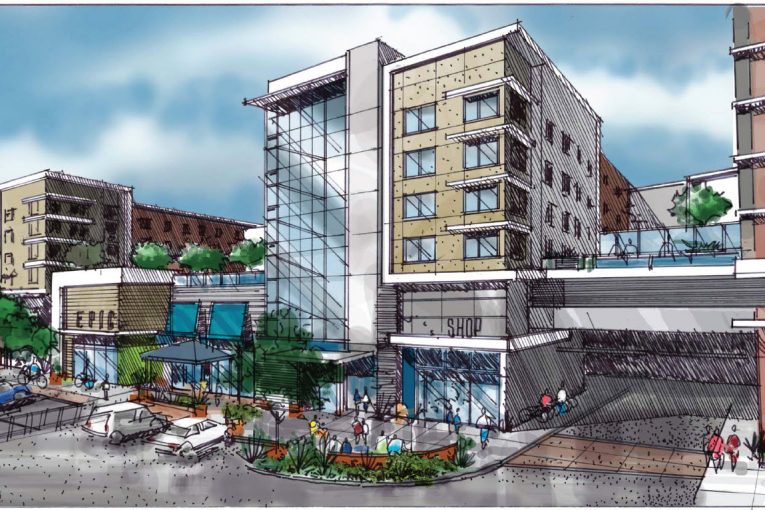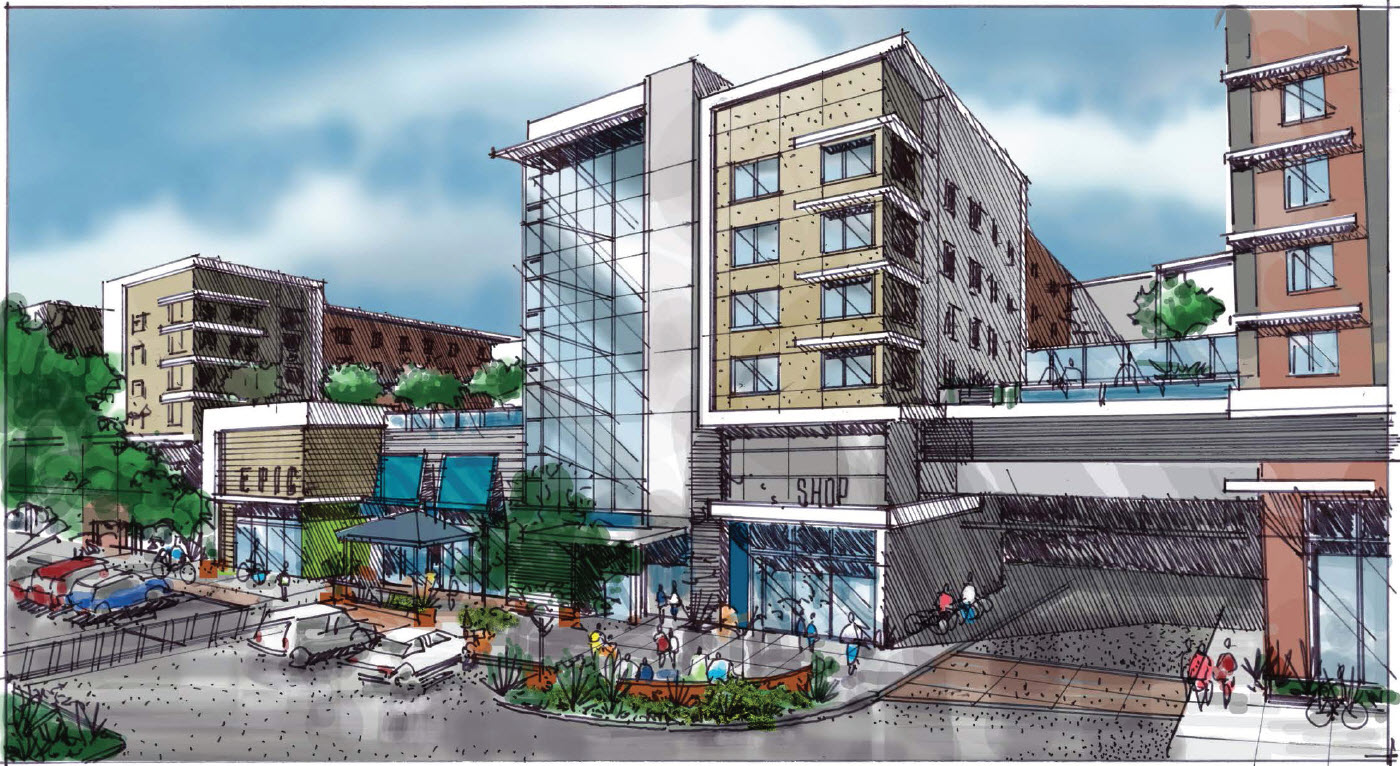

By David M. Greenwald
Executive Editor
Davis, CA – It seems like, since the pandemic, the council has largely put off some of the tougher conversations until later. But in the last month, we have seen what I consider to be the triple crisis of Davis—schools, housing, finances—coming to the fore.
Last month, the council had preliminary discussions with the school district regarding declining enrollment, but on Tuesday, the council will meet two of those issues head on—housing and finances.
The decision by newly-elected Councilmember Bapu Vaitla to appeal the University Mall redevelopment project is absolutely crucial—even if it seems unlikely to change anything.
A lot of people are frustrated at what has transpired there. It was a long and acrimonious process that ultimately led to the approval of a dense, mixed use project at the University Mall site in 2020. It took a compromise and a rare 3-2 council vote to  achieve it.
achieve it.
But Brixmor determined that ultimately they could not build it and came back to the city with a commercial-only project.
Could they have built it as originally proposed at seven stories? We don’t know. What we know is, as the city put it, “A property owner has the right to build or improve their property, within the regulations of the local zoning code, which in this instance allows retail-only or mixed-use,” and Brixmor has consistently told the City that “they will not build mixed-use and they will pursue retail-only.”
From the city’s standpoint, you have a large and underutilized property across the street from the university and now you are being told you cannot have a mixed-use project there. For a lot of people, that is a difficult pill to swallow.
The Planning Commission wasn’t happy but ultimately followed staff recommendations.
Enter Bapu Vaitla.
“I do not believe that ‘development of the site and new structures will enhance the site and the neighborhood,’ as stated in the Findings,” the councilmember wrote.
Citing “Neighborhood Character,” Vaitla continued, “I do not believe that the ‘proposed architecture, site design, and landscape are suitable for the purposes of the building and the site and will enhance the character of the neighborhood and community’ or that the project ‘will be consistent with existing and anticipated surrounding development,’ as stated in the Findings.”
He added, “A single-story commercial structure oriented towards automobile access does not conform to current urban planning best practices. The current and planned developments to the west and south (on UC Davis property) are increasingly dense, and the future of neighborhood plazas in Davis will likely strongly emphasize mixed-use development.”
It’s not likely he will succeed. In fact, it’s probably unlikely that the council will even grant a hearing on the appeal. But, at least, Vaitla has raised the issue—an issue that desperately needs to be raised.
Meanwhile, the council growth subcommittee which consists of Mayor Will Arnold and Councilmember Vaitla have come forward with a recommended path forward for consideration of the four pending peripheral projects.
Basically the recommendation is for the City Council to consider placing one on the ballot for November 2024.
From a number of standpoints that makes some sense. The staff report and commission of course focus primarily on city staffing and feasibility and conclude that the timeline is such that one project can be brought forward by November 2024.
It also makes a good deal of sense from a political standpoint. Multiple projects on the ballot for November 2024 would likely be fatal to them all—although in 2018, both Nishi and WDAAC easily were approved by the voters in separate elections.
There is also the fact that only Palomino Place has filed a formal application. Two other projects are in the pre-application phase and one more is expected in a week or so.
The city has still yet to embark on its general plan update.
The subcommittee noted, “Absent a GP update there is little guidance in place on what the City and community priorities are for peripheral development.”
The subcommittee looked to develop “interim” criteria that could be used until a General Plan update is completed. They acknowledged, “These are not fully developed but provide a valuable starting point for pursuit of a more in-depth framework in the near future.”
Some will likely argue or try to argue that, absent a General Plan update, the city should wait to process applications. They may not be able to legally do that.
Moreover, it is not clear how the city plans to proceed with processing four peripheral projects. Can they really delay some of these projects until 2026 and beyond? What happens if the applicants decide to challenge the city in court? And also, what happens if the voters continue to reject housing projects?
All of this is speculation on my part.
Overall the community has expressed concern about the affordability of housing and, in the abstract at least, acknowledges the need for more housing. Housing would go a long way toward alleviating concerns by the school district about declining enrollment.
But building housing in Davis has proven difficult—and while Measure J is part of that difficulty, as we saw with the University Mall, it’s not the only difficulty.
It seems probable that the next 18 months or so leading up to November 2024 will tell us a lot about whether the current path is viable.
Finally, as discussed in some detail in yesterday’s column, the city will also decide about putting a revenue measure on the ballot. Not only has the city struggled with its finances for a long time, those problems have likely be exacerbated by inflation.
As noted in yesterday’s column, the city really needs to lead a community discussion—not just on finances, but on the overall future of this community whose character is likely to radically change as the cost of living takes Davis outside of the range of middle-income families.


It’s a trifecta crisis I tell you.
Do you not think that inflation has hit Davisites hard too? So they need to get hit even harder with yet more new taxes?
Guess you shouldn’t have voted against all those economic development projects.
You’re acting like it’s a forgone conclusion that Davis taxpayers are going to vote yes on any new tax proposals.
Not at all. They voted down the parcel tax in 2018. I think it was incredibly short-sighted and will cost a lot more in the long run. But if they put a general tax on the ballot, it’s hard to imagine a tax measure not getting 50 percent.
The future is on the line this week. LOL! The future was on the line when Measure J was renewed. This week is only a skirmish.
That’s silly. Next time at least put an opposition argument on the ballot. That said, if you read the bottom of the article, you see my feeling that if Davis mishandles this, Measure J could be threatened either by the state or lawsuit.
Agreed – it’s pretty funny. I’ve been reading these type of headlines ever since I started reading the Vanguard.
Neither of those two (Nishi, and WDAAC) were anything like Shriner’s, 100% Housing DISC, or the re-emergence of Covell Village. (I’d put Palomino Place in a separate category from these three, though it certainly got trounced in its last iteration.)
Do the developers themselves fight among themselves (and with the city), in regard to which one goes first on the ballot? I would think that whatever one goes first has a better chance.
Does the city have a “right” to delay any of them? Seems to me that Palomino Place was the first one to apply.
I say, put them all on the ballot simultaneously, and let them fight it out. (The sheer combined number and size of these proposals should be enough to scare anyone.)
But in regard to Bapu’s efforts, it is interesting to see him try to derail the redevelopment of the mall, using the same type of arguments that those accused of being NIMBYs use. (Which, in the latter’s case, is usually described as disingenous.)